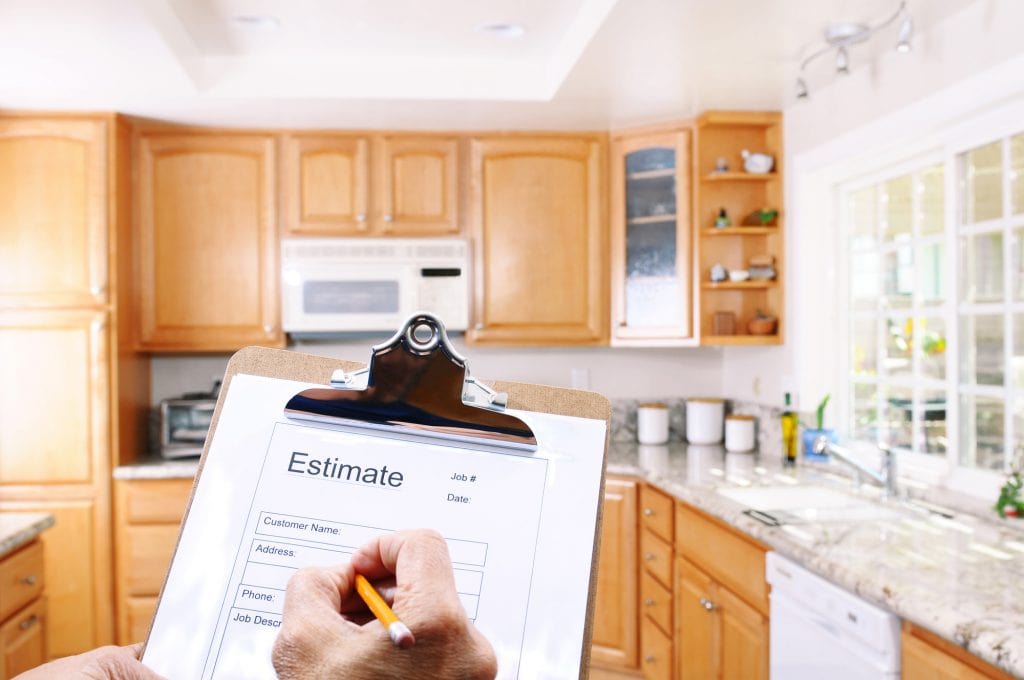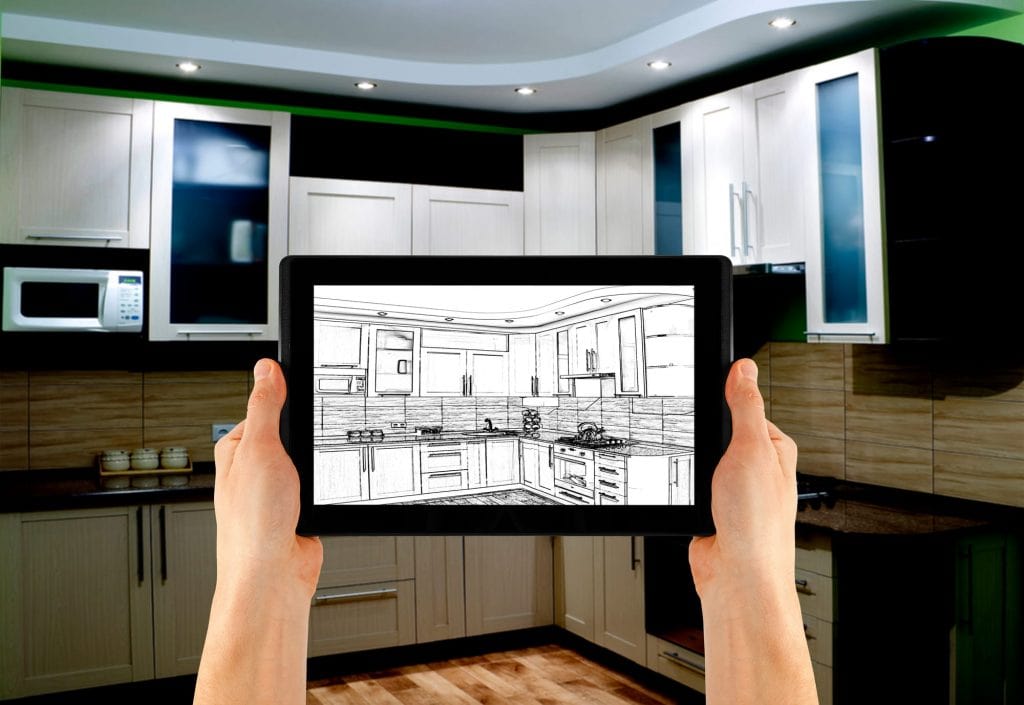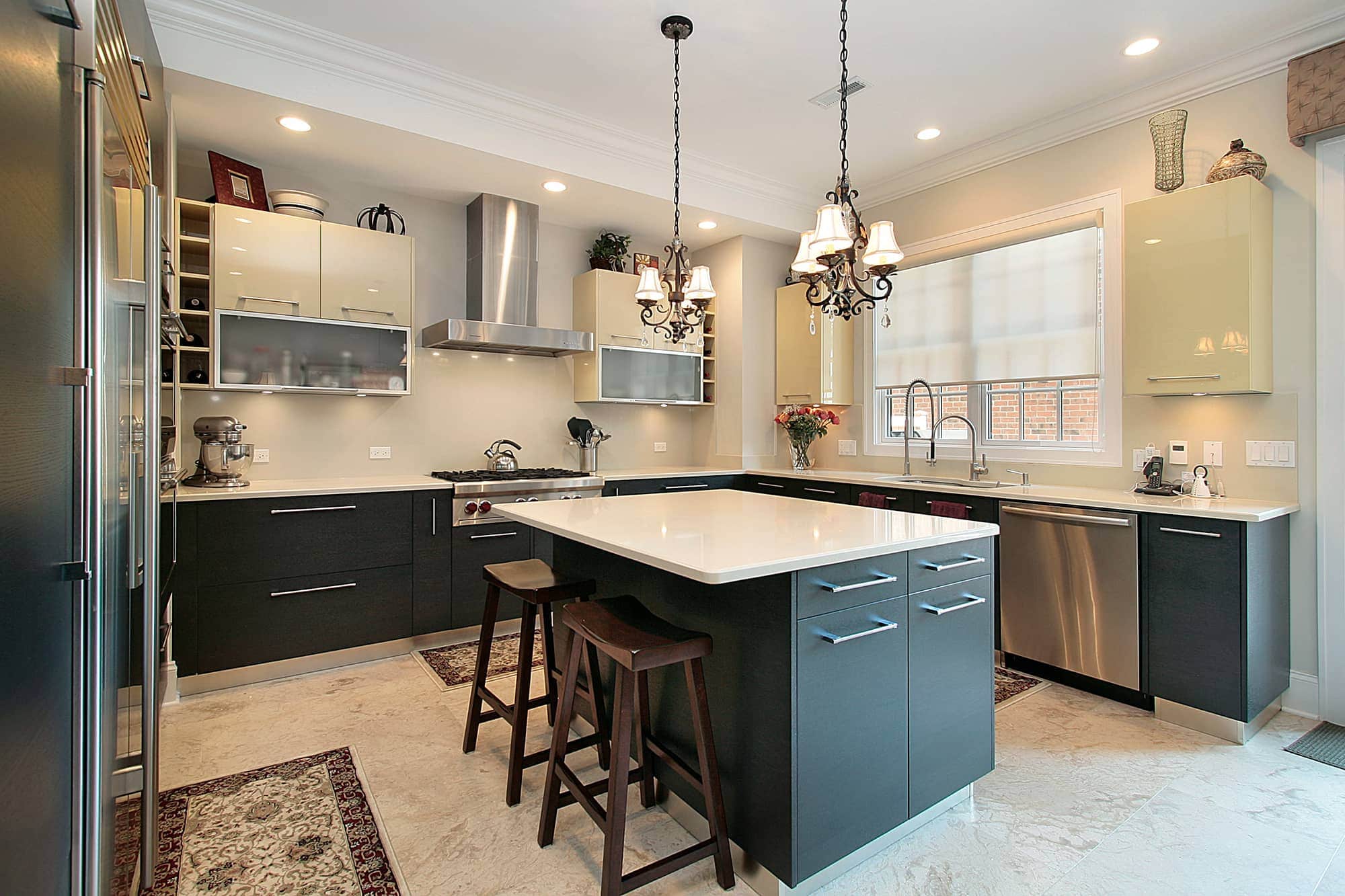A kitchen remodel can be among the most rewarding and complex home improvement projects. Whether envisioning a minor kitchen remodel or a complete kitchen renovation, a well-executed plan is crucial to achieving your dream kitchen.
In fact, with careful planning, you can ensure a favorable return on investment, considering the kitchen is a crucial factor when buying a home. Lucky for you, we are here to help you plan, budget, and carry out your remodel with tips from the experts, so follow along!
The Importance of Planning and Budgeting for a Kitchen Remodel
Planning and budgeting for a kitchen remodel are crucial to ensure your project stays on track and within your financial means. A remodel requires an investment of both time and money. Therefore, a thorough plan and a comprehensive budget can help manage your expectations, limit unnecessary expenses, and prevent project delays.
A well-structured plan lets you outline the kitchen layout, choose the right kitchen appliances, decide on the countertop materials, and select the perfect light fixtures. Similarly, an all-encompassing budget keeps your kitchen remodel cost in check, enabling you to choose between custom cabinetry or cheaper materials without compromising your project’s quality.
Assess Your Needs and Goals
Creating goals for your kitchen remodel based on your immediate and future needs is the best way to get the most out of your remodel. Take these steps to get your planning process started:
- Assess your overall kitchen needs. Do your kitchen cabinets need to be updated? Is your kitchen island not functional? Or do you lack counter space? Identifying the weaknesses of your current kitchen allows you to create a plan that addresses these issues and creates a more functional space.
- Determine your desired outcomes for the remodel. Do you want a modern kitchen with high-end materials and stainless steel appliances? Are you looking to create a spacious kitchen with an open layout for entertaining guests? Or do you want to boost your home’s sale price by making minor updates that appeal to prospective buyers?
- Identify specific needs and priorities based on your kitchen size, lifestyle, and personal preferences. If you love to cook, investing in a significant kitchen remodel with a more oversized kitchen island, quality of materials, and top-of-the-line appliances might be worth the kitchen remodeling cost.
If you’re more of a casual cook, a minor remodel, or a simple kitchen update with a fresh coat of paint on the walls, new light fixtures, and a tile backsplash could be more suitable.
Considering the cost of a kitchen remodel varies significantly based on project scope and location (with cities like San Francisco often bearing higher remodeling costs), understanding your needs and setting clear goals can help you to allocate your kitchen remodel budget more effectively.
Set a Realistic Budget
Setting a realistic budget for your kitchen remodel is essential to avoiding financial strain and ensuring the successful completion of your project. Begin by researching your area or ZIP code’s average kitchen remodel costs.

The cost of a kitchen can vary greatly, from a minor remodel of a small kitchen to a complete renovation of a larger kitchen. Various factors, such as kitchen size, the quality of materials chosen, and labor costs, contribute to the total cost.
Once you have a rough estimate of the average kitchen remodel cost, determine your overall budget limit. Consider your financial situation and consider different funding options, such as equity or personal loans, if necessary.
Remember that it’s also essential to set aside a portion of your budget for unexpected expenses or extra costs that may arise during the renovation project.
Next, allocate funds to different aspects of the remodel. Consider the costs of kitchen cabinets, kitchen appliances, flooring, light fixtures, and countertop materials. It’s important to note that custom cabinetry, natural stone countertops, and high-end devices will be more expensive. In contrast, budget materials and energy-efficient appliances can help reduce costs.
Define the Scope of the Project
Defining the scope of your kitchen remodel involves outlining the specific changes and improvements you want to make. Do you plan to renovate the entire kitchen or update the kitchen countertops and lighting fixtures? Are you considering knocking down load-bearing walls to create an open layout, or are you looking to add more counter space with a kitchen island?
Remember, major projects like a complete kitchen remodel will naturally incur a higher kitchen remodeling cost.
Consider the practicality and feasibility of your ideas. For instance, while stainless steel appliances and high-end finishes might be desirable, they might only be practical if you’re on a tight budget or if they match the style of your home. It’s crucial to balance your dream kitchen aspirations with the reality of your budget and space constraints.
Feel free to consult with professionals for guidance and advice. A professional kitchen designer can provide valuable insights on maximizing your kitchen space, choosing suitable materials, and ensuring the project meets safety standards.
Research and Select Professionals
Successful kitchen remodeling projects often involve a team of skilled professionals, including contractors and kitchen designers. Begin by searching for reputable professionals in your area. You can do this through online platforms, recommendations from friends or family, or by consulting your real estate agents.
Once you’ve shortlisted potential contractors or designers, dive deeper by reading reviews and checking their credentials. Look for professionals with positive customer feedback, extensive experience, and valid licenses and insurance.
Lastly, obtain multiple quotes and compare services. This practice will give you a better idea of the market rate and help you choose a contractor who offers the best value for your kitchen remodel budget. Remember, the cheapest quote may not always provide the best service, and the most expensive might not necessarily mean the highest quality.
Choosing a professional who understands your vision and can deliver your dream kitchen within your budget is essential.
Create a Detailed Plan
Creating a detailed plan for your kitchen remodel is crucial for ensuring a smooth renovation process. Start by sketching or visualizing your ideal kitchen layout. Consider using a kitchen design tool or consulting with a professional designer.
Remember the space’s functionality and workflow, especially if you’re an avid cook or regularly entertain guests. Elements like kitchen islands, countertop space, and the placement of kitchen appliances can significantly affect the efficiency of your kitchen space.
Next, make decisions about materials, colors, and finishes. Would you prefer stainless steel appliances, or are you more attracted to energy-efficient ones? Are you interested in custom cabinets, or would prefabricated options work for your kitchen? Do you envision a glass tile backsplash or a ceramic tile one? Your choices will significantly influence your kitchen remodel’s aesthetic and cost.
Establish a Timeline
A clear timeline is crucial in coordinating the various elements of your kitchen remodel and ensuring that the project stays on track. Break down the remodel into minor phases or tasks, such as demolition, plumbing and electrical work, cabinets and countertops, painting walls, and final touches.
Remember to allot time for potential delays and unexpected issues. Kitchen remodeling projects often encounter unforeseen challenges, such as structural problems discovered during demolition or items on backorder.
Create a schedule for each remodel step, from the initial planning and budgeting phase to the final walk-through and cleanup. Having a program can also help you manage your living arrangements during the remodel, especially if your kitchen will be out of commission for an extended period.
Contingency Planning
Contingency planning is essential for navigating unexpected challenges or costs during your kitchen remodel. Begin by setting aside a contingency budget. This factor should be a portion of your kitchen remodel budget—typically around 15-20%—to cover unexpected expenses.

Next, anticipate potential challenges and setbacks. For example, older homes may contain lead or asbestos, which would require professional remediation. Other common issues include structural problems, outdated electrical systems, and unforeseen plumbing issues.
Lastly, develop alternative solutions or backup plans for potential issues. This practice could involve choosing alternative materials or finishes, adjusting your design plans, or extending your timeline. Having a contingency plan can help ensure your kitchen remodel continues smoothly, no matter what surprises may come up.
Manage Costs During the Remodel
Keeping track of expenses is critical in ensuring your kitchen remodel stays within budget. It can be helpful to create a budget spreadsheet to monitor your spending and ensure that you’re accounting for all costs, from materials and labor to permits and inspections.
Remember to explore cost-saving options that maintain quality. For instance, rather than opting for custom cabinetry, you might find that ready-to-install cabinets meet your needs at a fraction of the cost. Or, instead of natural stone countertops, you could choose a high-quality laminate that mimics the look of stone.
Maintain open communication with your contractors about your budget. Most professionals are accustomed to working within various price ranges and can offer guidance on where to splurge and where to save.
Allow for Flexibility
While having a detailed plan and budget for your kitchen remodel is crucial, allowing for some flexibility is equally important. You might need to adjust or modify the original plan as the project progresses. Whether due to unforeseen obstacles, changes in your preferences, or a fluctuation in the real estate market, it’s wise to remain adaptable.
Prioritize the essential aspects of the remodel—those that will most significantly impact the functionality and aesthetic of your kitchen—and be prepared to make compromises or trade-offs on less crucial elements.
Key Takeaways
Planning and budgeting for a kitchen remodel can be intricate, but it’s critical to ensuring a successful renovation. By assessing your needs, setting a realistic budget, defining the project scope, and allowing for flexibility, you can create a dream kitchen that enhances your home’s value and quality of life.
Remember, every kitchen remodel is a journey that involves strategic decision-making, careful planning, and occasional compromises. Remember the potential return on investment, especially if you plan to sell your home.
Ready to transform your current kitchen into your dream kitchen? Start today by exploring properties for inspiration, or contact a local eXp agent to discuss how a kitchen could impact your home’s value. Our real estate agents are always ready to assist and guide you.
Frequently Asked Questions
Before embarking on your kitchen remodel, having several questions is normal. Here are answers to some of the most commonly asked questions about kitchen remodeling:
How much does a 12×12 kitchen remodel cost?
The cost of a 12×12 kitchen can vary significantly based on the project’s scope, quality of materials, and your regional location. On average, homeowners spend between $75 and $250 per square foot on a kitchen remodel. A 12×12 kitchen translates to $10,800 to $36,000 for a minor remodel and upwards for a significant remodel with high-end materials.
What costs the most in a kitchen remodel?
In most kitchen renovations, the highest costs are typically for cabinets, which can account for up to 40% of the overall budget. Other significant expenses include installation costs, appliances, countertops, and flooring.
Are kitchen renovations worth it?
A well-done kitchen renovation can significantly increase the value of your home and improve its appeal to potential buyers. According to Remodeling Magazine’s Cost vs. Value report, homeowners can expect to recoup about 53-68% of kitchen remodel costs when they sell their homes.
Where do I start to renovate my kitchen?
Start by assessing your current kitchen’s shortcomings and determining your goals for the remodel. Then, set a realistic budget, research contractors, and create a detailed plan. Consulting with a professional kitchen designer can also be helpful.
How long does a kitchen remodel take?
The timeline for a kitchen remodel can vary widely based on the project’s scope. On average, a significant kitchen remodel takes about three to six months, from start to finish, including planning, ordering materials, and construction.
Which kitchen layout is the most functional?
The most functional kitchen layout often depends on the size and shape of your space, but many designers recommend the “work triangle” layout. This factor places the refrigerator, stove, and sink at three triangle points for optimal efficiency.
What adds the most value to a kitchen remodel?
Investments in functional improvements, like updated appliances or additional counter space, can add significant value. Modern updates like stone countertops or hardwood floors appeal to potential buyers.
How can I reduce the cost of my kitchen remodel?
You can save money on your kitchen remodel by keeping your current layout (which reduces plumbing and electrical costs), choosing ready-to-install cabinets, opting for cost-effective countertop materials, and doing some of the lighter work, like painting, yourself.
What is the best season to renovate a kitchen?
The best season to renovate a kitchen depends on your circumstances and preferences. Spring and summer are often favored for kitchen remodels due to longer daylight hours and potentially better paint and stain-drying ventilation.
Can you stay in the house during a kitchen remodel?
Yes, you can often stay in your house during a kitchen remodel, but it can be inconvenient and disruptive. A temporary kitchen area can help manage meal preparation during the renovation. Some people temporarily move out during significant construction, especially in major remodeling projects.





